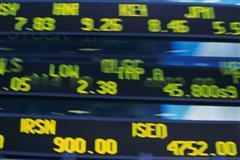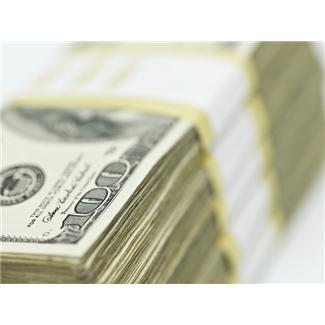| Home | About | Archives | RSS Feed |

The Independent Investor: Sour Grapes
 As the G20 conference gets under way today in Korea, I expect the currency war will escalate now that the U.S. Federal Reserve has launched the second round of quantitative easing. As the dollar continues to decline, our trading partners are getting back a little of their own and they don't like it.
As the G20 conference gets under way today in Korea, I expect the currency war will escalate now that the U.S. Federal Reserve has launched the second round of quantitative easing. As the dollar continues to decline, our trading partners are getting back a little of their own and they don't like it.
Over the last week or so, the Fed's QE II announcement has been greeted by a chorus of howls from all over the world. Germany's finance minister called U.S. policies "clueless" while Chinese officials quickly added their own criticism.
"As long as the world exercises no restraint in issuing global currencies such as the dollar, then the occurrence of another crisis is inevitable," stated Xia Bin, an adviser to China's central bank.
Brazil's finance minster, Guido Mantega, went further when he said, "Everybody wants the U.S. economy to recover, but it does no good at all to just throw dollars from a helicopter."
Those are just a few choice criticisms but there were many more from nations throughout the world accusing the U.S. of everything from currency manipulation to exporting inflation. They may be right but that doesn't mean we are wrong.
For decades, the U.S. has been running a major trade deficit with our international trading partners. All these countries that are squawking about QE II have been major beneficiaries of a monumental trading imbalance with the U.S. both now and in the past. In Latin America, for example, Brazil, among others, has benefited mightily by keeping its own currency artificially low and exporting huge quantities to the U.S. China is another master of currency manipulation and has followed a weak currency/high export policy for years. Germany is also enjoying booming exports, trade surpluses, low debt and an unemployment is expected to fall to 1990s levels thanks to a weak euro.
So after carrying the weight of the rest of the world's exports for years, the U.S. is fighting back and well it should. It is our nation and not any of the above countries, which is suffering a high unemployment rate, a slow growth recovery, huge trade deficits and a record debt load. We are simply following the same prescription both Japan and Europe followed after WWII, which Latin America followed after their Lost Decade of the 1980s. China's economic miracle is founded and continues to grow along these same economic principles.
Now that America has decided to play the same game, cries of "foul" echo across the world. It is true that America's actions will cause problems for economies around the world. Right now it makes a lot of economic sense for foreigners to borrow in dollars where interest rates are at rock bottom and then invest that money in building plants and equipment back home where interest rates and local currencies are higher. Of course, their governments already hold huge dollar reserves in the form of U.S. Treasury bonds. Foreign central banks fear that all this additional dollar borrowing may cause inflation in their own countries.
You might ask how critics can take the moral high ground and point a finger when for years they have been doing the same thing to us and acting as if America was their own private export market. Nations, however, are not individuals; which brings to mind a quote of Thomas Jefferson, one of our founding fathers:
"Money, not morality, is the principle commerce of civilized nations."
Bill Schmick is an independent investor with Berkshire Money Management. (See "About" for more information.) None of the information presented in any of these articles is intended to be and should not be construed as an endorsement of BMM or a solicitation to become a client of BMM. The reader should not assume that any strategies, or specific investments discussed are employed, bought, sold or held by BMM. Direct your inquiries to Bill at 1-888-232-6072 (toll free) or e-mail him at wschmick@fairpoint.net. Visit www.afewdollarsmore.com for more of Bill's insights.
| Tags: currency, trade, deficit, G20 |
@theMarket: Marking Time
This coming week will be a humdinger for the markets. The Federal Reserve is expected to begin a second round of quantitative easing and voters will deliver their verdict on the economy in mid-term elections. Both events will have ramifications for investors and stock markets worldwide.
The Fed's decision to further stimulate the economy via a second round of quantitative easing (QE II) has already been priced into the market, in my opinion, but the impact of the mid-term elections has not. If the Republicans gain a majority in the House and additional seats in the Senate, as many political pundits predict, then the markets have reason to rally in the months, if not weeks ahead.
For me, the question is when, not if, the markets will gain more ground. Stocks (and some commodities) are somewhat overbought right now and looking for an excuse to pull back. Maybe the election results will precipitate a "sell-on-the-news" reaction in the very short term. The question I ask is whether the lame-duck Congress will give investors an added excuse to sell?
Most readers are aware that the Bush tax cuts are scheduled to expire in 2010. Will Congress act to extend those cuts before the end of the year? If it does (by extending the tax cuts for many, if not all, Americans), then the markets could see substantial gains. On the other hand, if nothing is done and the tax cuts are allowed to expire than we may be in for a period of uncertainty.
Since I have been attending Charles Schwab's yearly investor conference in Boston this week, it was a good opportunity to take the pulse of the best and brightest on Wall Street as they shared their views of the market and economy. Clearly, just about everyone I talked to is bullish. Not once did I hear the term "double-dip recession," and for the most part, just about everyone was looking for strong markets between now and at least the second quarter of 2011.
In addition, no one likes bonds, especially U.S. Treasury bonds. "Bubble" was the term most often used when describing the $70 trillion investors have stashed away in the bond market. Most argue that the perceived safety that investors see in bonds is an illusion. The investment team from Gameco Investors Inc. headed by famed value investor Mario Gabelli argued that bonds are "in the ninth inning of a 30-year run" providing holders with little yield, no growth prospects and a mountain of interest rate risk. In addition, "Money markets are also not as safe as you think," said Gabelli.
He points out that the $2.8 trillion in money-market funds has a great deal of dollar risk in the form of depreciation, inflation and debasement, besides offering little in the way of yield or growth.
Currency wars was also a leading topic of discussion with most participants believing the battle between nations to keep their currencies weak will continue. The prognosis for the greenback is more weakness ahead as America attempts to export its way to greater growth. As a result, U.S. companies that export are in vogue, especially technology stocks.
Gold, precious metals and commodities in general was an area of heated arguments, with some dismissing the recent run ups as irresponsible speculation while others read the price moves as a rationale answer to declining currencies and the inevitable rise in inflation that lurks just around the corner.
Emerging markets are once again in favor as an area for long-term investment. Bulls point to the increasing percentage of global GDP (49 percent) represented by these fast-growing economies as opposed to what they consider is an underrepresented share of the world's stock market capitalization (only 31 percent).
In the minus column, financial stocks stood out as an area that won't regain its pre-2008 luster anytime soon, neither will consumer discretionary stocks. In both cases, these sectors suffer from the deleveraging that is under way among American consumers. Banks, whose major business is making loans to customers, will experience low growth since Americans are trying to reduce, not increase, their debt as a percentage of their personal income. Consumers are reducing that debt by cutting back on their discretionary spending.
All in all the tone was upbeat at the conference and it felt that business was beginning to get back to normal after several years of strife. Whether that is a good thing when discussing the financial services sector is a matter of opinion.
Bill Schmick is an independent investor with Berkshire Money Management. (See "About" for more information.) None of the information presented in any of these articles is intended to be and should not be construed as an endorsement of BMM or a solicitation to become a client of BMM. The reader should not assume that any strategies, or specific investments discussed are employed, bought, sold or held by BMM. Direct your inquiries to Bill at 1-888-232-6072 (toll free) or e-mail him at wschmick@fairpoint.net. Visit www.afewdollarsmore.com for more of Bill's insights.
| Tags: recession, currency, bonds, forecast |
@theMarket: Third-Quarter Earnings Reveal Two Economies
 With one quarter of the companies in the S&P 500 already reporting, third quarter earnings have been a positive surprise. Eighty-six percent have exceeded earnings estimates and 67 percent have posted higher revenue numbers. What the numbers don't say is that most of those gains have come from overseas.
With one quarter of the companies in the S&P 500 already reporting, third quarter earnings have been a positive surprise. Eighty-six percent have exceeded earnings estimates and 67 percent have posted higher revenue numbers. What the numbers don't say is that most of those gains have come from overseas.
The revenue number is where we should focus our attention. Higher earnings can be achieved by simply continuing to cut costs (by firing workers, for example). However, looking at the revenue numbers gives us a clear understanding of where the growth is coming from. Not much of it is coming from the home front. A lot of that growth is coming from higher sales in Asia and other emerging markets.
Since the bottom of the recent recession here in America, the majority of firms in the S&P 500 have been exporting their way into profitability. This quarter was no different. Take United Parcel Services; it is one of the companies that investors consider a good barometer of the global economy because it delivers products everywhere. UPS showed a 3.5 percent increase in growth versus last year here at home while their international growth was 13.7 percent. Many other companies are experiencing the same phenomenon.
Clearly, the falling dollar has helped exports as has the increasing strength in emerging market economies, particularly in Asia. And this weekend all eyes will be focused on the latest round of G20 talks in Seoul, where the ongoing battle to "beggar they neighbor" will continue. We can expect currencies to be one of the main topics of conversation since our own U.S. Treasury Secretary Tim Geithner has already fired the first broadside. In an open letter he has asked members to "refrain from exchange rate policies designed to achieve competitive advantage by either weakening their currency or preventing appreciation of undervalued currency."
In last week's column, "The Coming Currency War," I explained how the world's governments are using their currencies to increase exports at the expense of their neighbors. Clearly, U.S. third-quarter earnings underscore how our own policies have aided and abetted U.S. companies in exporting more. This makes Secretary Geithner's request look a bit suspect in my opinion. It will be interesting to see the response of other governments.
I mentioned last week that I was waiting for commodities, specifically gold and silver, to pull back. I expected that pullback to be sharp, and it has been. After hitting a high of $1,380 an ounce, gold dropped as low as $1,317 an ounce in what felt like a blink of the eye. Silver also had a commensurate move downward. As expected, a rise in the dollar was the catalyst for that pullback. Traders will wait until they see the results of this weekend's G20 meet before going back into precious metals or other commodities.
There is always the risk that some new policy initiative could strengthen the dollar and thus continue the commodity sell-off. It could happen, but I wouldn't hold my breath. There are few new policy alternatives on the table in Washington to revive the economy so my bet is that after a brief period of strength, the dollar will resume its decline, gold and other commodities will continue higher and so will the stock market. Under that scenario, we are back to buying the dips. Invest accordingly.
| Tags: currency, global economy, dollar |
The Independent Investor: The Coming Currency War
 |
The International Monetary Fund and its members were in no mood to agree on a unified policy of currency movements at their weekend meeting in Toronto. Finger pointing and veiled threats of retaliation were hurled at China from both American and European members, among others. Underneath all the rhetoric, I fear we are in a race to the bottom as countries vie to reduce the value of their own currencies while demanding that others strengthen theirs.
Back in early 2009, in several columns, I speculated that just about every country in the world would try to export their way out of recession. In order to do that, each country would endeavor to keep their currency as cheap as they could, thereby reducing the prices of their exports. It’s also a fact that some countries (Brazil, India, China) weathered the world recession far better than others. Critics argue that part of the reason that occurred was that these countries contrived to keep their currencies artificially low and continued to export as much as they could.
Unfortunately, today the world still grabbles with high unemployment and an economic recovery that is anemic at best. As deficits mount and governments scramble to increase the pace of growth, each country is vying to take an increasing share of a shrinking global economic pie. It is the real cause of this war of words which could soon take on a much more concrete form of expression.
China, due to its size and economic prowess, has been singled out as the main culprit in this on-going currency manipulation. Over the weekend, the Chinese resisted demands to strengthen their currency. They argued that they were already beginning to do so, but “gradually”. They warned that if their currency, the yuan, did not remain stable, it would bring disaster to China and the world.
This was seen by the United States as just more stonewalling. Unfortunately, lawmakers are meeting this week to consider punitive measures against China for undervaluing their currency. Called the “Currency Reform for Fair Trade Act," the legislation is intended to make it harder for the Commerce Department to ignore taking retaliatory actions against Chinese exports that are judged to be benefiting from a weak currency. The passage of such a bill could easily ignite a trade war where we levy duties or outright ban Chinese import A, while China retaliates by doing the same to U.S. import B.
To date, the White House has been able to short circuit any Commerce Department recommendations for any trade embargos that Congress has demanded. People such as U.S. Treasurer Tim Geithner have chosen a less strident approach in convincing other nations to compromise on the currency question. But if this bill passes the landscape could change quickly. It is just this kind of protectionist legislation that extended and prolonged our own Great Depression and that of the rest of the world in the 1930s.
However, before we cast all the blame on China, consider this: many other countries (including our own) are participating in this currency race to the bottom. The Japanese, for example, over the past month have continually intervened to slow the rise of the yen, which is hurting their exports. So far the price tag for that intervention has cost them 2 trillion yen.
Here at home, the Federal Reserve’s announcement in September that a second tranche of quantitative easing (QE II) is in the works has shaved 7 percent off the greenback’s value in less than three weeks. Last Friday, the Brazilians spent billions to weaken their own currency, the real, and over in Europe the Swiss have been doing the same for months. The euro, thanks to the PIGS (Portugal-Italy-Greece-Spain) crisis, has had its own ups and downs.
Since the dollar is still the world’s main reserve currency and it is dropping in value (as is every other currency at the same time) it makes sense that commodities have suddenly caught fire. Since commodities are denominated in U.S. dollars, their value continues to rise as the dollar declines. In a currency war where paper currencies become increasingly suspect and valueless, proxies will appear. This is what I believe is driving the price of gold to new highs. As long as world players insist on growing at the expense of their neighbors, you can expect commodities to continue to rise.
| Tags: currency |
|

